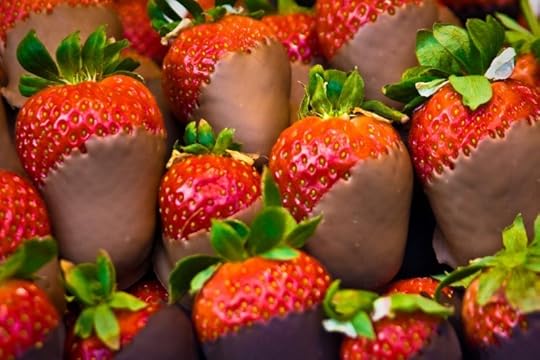Monthly etymology gleanings for March 2014
One should not be too enthusiastic about anything. Wholly overwhelmed by the thought that winter is behind, I forgot to consult the calendar and did not realize that 25 March was the last Wednesday of the month and celebrated the spring equinox instead of providing our readership with the traditional monthly gleanings. To make things worse, while writing about 23 March, I had 23 June (the solstice) in mind and danced around a bonfire three months ahead of time. The first faux pas attracted almost no one’s attention (just one puzzled letter), but the second earned me some well-deserved mockery. The text was at once corrected, which made nonsense of the comments, but even with the help of computers, those wonderful machines that allow us to erase the past, one cannot undo what has been done. To entertain our readers and by way of making amends, I’ll quote a sentence from the beginning of Kipling’s “Elephant’s Child”:
“One fine morning in the middle of the Precession (sic) of the Equinoxes this ’satiable Elephant’s Child asked a new fine question that he had never asked before. He asked, ‘What does the Crocodile have for dinner?’”
In the spirit of following the precession of equinoxes I’ll provide a two course crocodile dinners: next week, another set of “gleanings” will follow this one.
StrawberryOne fine morning a faithful reader of this blog asked: “What is the origin of the word strawberry?” Before enlarging on this much-discussed moribund topic, I would like to quote another passage. It occurs at the end of the preface to Bartlett J. Whiting’s book Proverbs, Sentences, and Proverbial Phrases from English Writings Mainly Before 1500:
“In the third edition (1661) of the Compleat Angler (p. 118) Isaac Walton quotes Dr. Boteler (?William Butler) as having said of strawberries, ‘Doubtlesse (sic) God cou’d have made a better berry, but doubtlesse God never did’.”
Different opinions about the etymology of strawberry crowd out one another on the Internet. A page from my book Word Origins is also there, and I could (cou’d) have confined myself to a brief reference to Google, but I have something new to say in addition to what appears there and will therefore devote some space to the delicious berry.
The double trouble with strawberry is that no other European language has a similar name (one late occurrence in Swedish is of unknown provenance) and that, on the face of it, straw- makes little sense in it. The word goes back to Old English, and there must have been a serious reason for coining it or for changing the traditional denomination (that is, “earth-berry,” which did turn up at that time but, judging by the extant texts, was known very little). One thing is clear: the Germanic invaders of Great Britain did not bring the word strawberry to their new homeland from the continent.
A change reminiscent of the one known from the history of English also occurred in Swedish. Only in that Scandinavian language “earth-berry” was replaced with the obscure name smultron, a regional word, as it seems. The change occurred some time before the beginning of the fifteenth century. Several conjectures about the origin of smultron exist, but none is fully persuasive. I am sure heavy thoughts about etymology never bothered Ingmar Bergman, the producer of Smultronstället, known in English as Wild Strawberries (stället means “the place”).
 Absolutely delicious and no straws attached.
Absolutely delicious and no straws attached. If we disregard Friedrich Kluge’s idea, which is wilder than wild strawberries, that straw- is related to Latin fragola “strawberry,” we will be left with trying to find out what straw has or had to do with this berry. (The editors of the OED knew the fragola idea and politely rejected it—politely, because scholars of Kluge’s stature have to be treated with deference.) The first element of the English word may have been strew rather than straw, with reference to the propagation by runners; Skeat found this explanation not improbable. Yet it is unlikely that the first element of the name in question was a verb. If straw was ever used in protecting strawberries, this practice would have been important only in gardening, but before naming the garden berry, whose cultivation is late, people gathered strawberries in the wild. Then there are straw-like particles (achenes) that cover the surface of this berry. So straw-like berry? This etymology is hesitatingly favored by the OED. Strawberries are often stringed, that is, collected and threaded on thin straws, another vague clue. It has also been suggested that strawberry is an alternation of strayberry. But what is strayberry? Folk etymology produces transparent words, not new riddles. According to the simplest guess known to me, strawberries often grow in grassy places and hayfileds. A tiny piece of evidence in support of this hypothesis is the fact that Swedish smultron first occurred in the compound smultronagræs around the year 1400.
We can see that the question remains open. After the publication of my book (all the suggestions listed above, except those related to Swedish, are listed there), a new work on this vexed subject appeared. It can be downloaded from the Internet (William Sayers, “The Etymology of strawberry”: Moderna språk 2009, 15-18). Most of the paper purports to show that all the previous suggestions are wrong (this is of course why scholarly papers are written). The author’s solution runs as follows:
“The most plausible origin for strawberry in its earliest reference to the Woodland Strawberry is as a name for plants growing at ground level (like straw spread as litter) irregularly distributed as the result of the spread of achenes by birds and animals—two interrelated senses of being strewn (this development was proposed by Leonard Bloomfield [in his book Language, pp. 433-434], who did not, however, recognize its exclusive relevance to the Woodland Strawberry). So reading the initial element of the compound then returns English strawberry to the Germanic fold as a variant on the ‘earth-berry’ designation.”
There is one thing that bothers me. If strawberry means approximately “earth-berry,” why did people go to the trouble of calling it something else, seeing that the most natural name (earth-berry) was available and widely known? So here we are: a delicious fruit and a troublesome word.
 Can anything be higher? Still in Scandinavia
Can anything be higher? Still in Scandinavia A correspondent remembered his father’s saying ish varda when he dealt with something very unpleasant. He asks what varda, which he believes to be a Scandinavian adjective, means. I suspect that varda is Norwegian var da, not an adjective but a verb followed by an exclamation. The whole seems to mean “ish was there.” Da also occurs in the “famous” uff da, used for the same purpose as the phrase quoted by our correspondent (see it in the last volume of Dictionary of American Regional English, where a special entry is devoted to it). Ish probably needs no comment; ish var da must have meant “disgusting was it.”
Uppsala: the origin of the nameI don’t think there is a problem. The earliest Uppsala, first mentioned in historical documents in the tenth century, was known to the skalds, who used the name in the plural (Uppsalir). Uppsala turns up in so-called legendary sagas. The place designated a town or a group of houses “up there,” as opposed to an older place called Sala.
Much more next week.
Image credits: (1) Chocolate-Coated Strawberries. Photo by Garry Knight. CC BY 2.0 via garryknight Flickr. (2) Cold spring day in Uppsala, Sweden. Photo by Alexander Cahlenstein. CC BY 2.0 via tusken91 Flickr.
The post Monthly etymology gleanings for March 2014 appeared first on OUPblog.

Oxford University Press's Blog
- Oxford University Press's profile
- 238 followers



